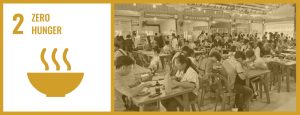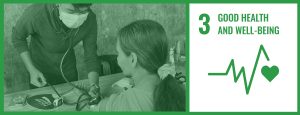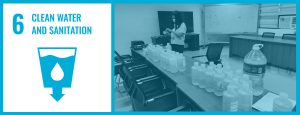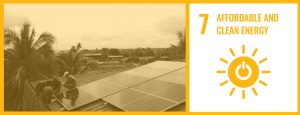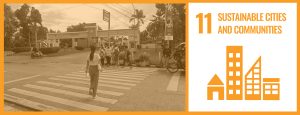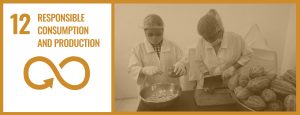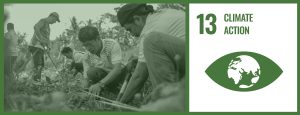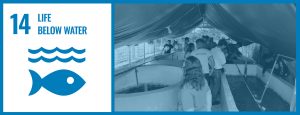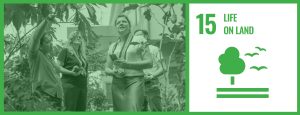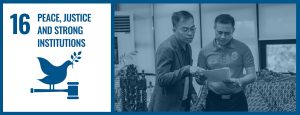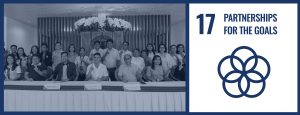2024 Reports | SDG 15 – Life on Land

SUPPORTING LAND ECOSYSTEMS THROUGH EDUCATION
Maintain and extend current ecosystems’ biodiversity
Isabela State University (ISU) has implemented its Land Use Development and Infrastructure Plan (LUDIP), which also serves as a framework for maintaining and enhancing existing ecosystems and biodiversity across its campuses. The plan ensures that all development and renovation projects are designed with environmental sustainability in mind, integrating measures that protect natural habitats, promote green spaces, and support native plant and animal species. By incorporating eco-friendly design elements such as green landscaping, natural ventilation, and sustainable materials, ISU ensures that infrastructure growth aligns with the preservation of ecosystems and contributes to biodiversity conservation, particularly in areas vulnerable to environmental degradation.
Educational programs on ecosystems
Isabela State University (ISU) offers comprehensive educational programs on ecosystem management and biodiversity conservation through its Bachelor of Science in Forestry (BSF) Program. This program emphasizes the scientific study and sustainable management of forests, focusing on the protection and responsible use of natural resources. It covers four key fields: Forest Biological Sciences, Forest Resources Management, Social Forestry and Forest Governance, and Forest Products Utilization.
Through this curriculum, ISU equips students and local stakeholders with the knowledge and skills needed to manage forest ecosystems, conserve wildlife, and protect soil and water resources. The program integrates classroom instruction, fieldwork, and community outreach, enabling learners to apply sustainable practices in real-world settings. By fostering both scientific understanding and ethical responsibility, ISU’s BS Forestry program contributes to the education of communities and professionals in promoting the conservation of wild flora, fauna, and ecosystem services at local and national levels.
Sustainable management of land for agriculture (edu outreach)
Isabela State University (ISU) actively supports the sustainable management of land for agriculture through its research, extension, and community outreach programs. The university implements various initiatives that promote environmentally responsible farming practices, including the “Massive Seedling and Seed Production Program” under the Department of Agriculture’s Bayanihan II Project. This program focuses on producing high-quality planting materials—such as 200 kilograms of seeds and 200,000 seedlings—for lowland vegetable farming on campus and in nearby communities.
Beyond production, ISU engages local farmers, students, and agricultural stakeholders through training sessions, workshops, and demonstrations that emphasize sustainable land use, soil conservation, and efficient farming techniques. These activities not only enhance agricultural productivity but also encourage long-term environmental stewardship. By integrating education, research, and extension services, ISU plays a vital role in teaching and empowering communities to adopt sustainable agricultural land management practices across the region.
Sustainable use, conservation and restoration of land (policy)
In alignment with its commitment to conserving and sustainably managing terrestrial ecosystems, Isabela State University (ISU) has established policies and programs that ensure the protection, restoration, and responsible use of forests, mountains, and drylands associated with the university. The College of Forestry and Environmental Management (CFEM) at ISU–Cabagan Campus, in collaboration with the Cagayan Valley Program on Environment and Development (CVPED), spearheads initiatives focused on reforestation, watershed rehabilitation, and biodiversity conservation.
These efforts are supported by the university’s broader environmental policies, which integrate ecosystem conservation principles into academic, research, and extension activities. Other ISU campuses also implement complementary programs that promote sustainable land use, habitat protection, and ecological restoration. Through these coordinated initiatives, ISU ensures that its land resources are managed in a way that preserves natural ecosystems, supports biodiversity, and contributes to climate resilience and environmental sustainability.
Monitoring IUCN and other conservation species (policies)
Isabela State University (ISU) demonstrates its strong commitment to biodiversity conservation through its Cabagan Campus, which has been officially designated by the ISU Board of Regents as a Wildlife Sanctuary. This designation establishes the campus as a protected area that serves as a natural habitat for various species of flora and fauna, including those that may be listed under the IUCN Red List and national conservation lists.Through this policy, ISU ensures the identification, monitoring, and protection of threatened and vulnerable species within its grounds. The university integrates wildlife conservation into its research and academic programs, particularly through its College of Forestry and Environmental Management (CFEM), which conducts studies on species diversity, habitat assessment, and ecosystem protection. Regular monitoring and habitat preservation activities are undertaken to prevent environmental degradation and promote ecological balance. By institutionalizing this wildlife protection policy, ISU reinforces its role as a steward of biodiversity, ensuring that university operations coexist responsibly with the natural ecosystems they encompass.
Local biodiversity included in planning and development
Isabela State University (ISU) integrates local biodiversity considerations into its planning and development processes through the implementation of its Land Use Development and Infrastructure Plan (LUDIP). This plan serves as a guiding framework to ensure that all construction, renovation, and land development activities are carried out with environmental sustainability at the core. It requires that projects protect and enhance existing ecosystems by preserving natural habitats, maintaining green spaces, and supporting native plant and animal species found within university grounds.
By incorporating eco-friendly design practices—such as green landscaping, the use of sustainable building materials, and natural ventilation systems—ISU ensures that infrastructure expansion does not compromise local biodiversity. Instead, it promotes harmony between development and the environment, safeguarding ecological balance and contributing to the long-term conservation of local species and habitats associated with the university’s campuses.
Alien species impact reduction (policies)
Isabela State University (ISU), through the Northern Luzon Innovation Center for Environment and Biodiversity Information, Research, and Development for Sustainability (NLIC-EBIRDS), actively implements initiatives that align with its policy to minimize the impact of alien or invasive species on campus ecosystems. One key effort is the establishment of a Biodiversity Plot located behind the College of Forestry and Environmental Management (CFEM), which serves as a living laboratory dedicated to the promotion, propagation, and conservation of native tree species.
This initiative supports the university’s broader goal of restoring ecological balance by prioritizing indigenous flora over non-native or invasive species that threaten local biodiversity. Through research, monitoring, and educational activities conducted by NLIC-EBIRDS and CFEM, ISU raises awareness of the ecological risks posed by alien species and encourages the use of native plants in landscaping, reforestation, and habitat restoration. This approach ensures that ISU’s campus development and environmental management practices contribute to the protection of native biodiversity and the reduction of invasive species impacts.
Collaboration for shared land ecosystems
Isabela State University (ISU) Cabagan Campus, in partnership with the Department of Agriculture – Regional Field Office 2 (DA-RFO2), implements a community-based goat dispersal and capacity development project aimed at supporting backyard farmers and promoting sustainable land ecosystem management. This collaborative initiative provides local farmers with quality goat stocks while equipping them with training on goat management, sustainable grazing practices, and animal healthcare to ensure long-term productivity and ecological balance.
Through this partnership, ISU fosters active community engagement in maintaining shared agricultural and land ecosystems by encouraging responsible livestock practices that prevent overgrazing, promote soil health, and optimize the use of natural resources. The project also strengthens local livelihoods while reinforcing ISU’s commitment to sustainable land use and ecosystem stewardship, integrating agricultural development with environmental conservation efforts within the surrounding communities.
LAND SENSITIVE WASTE DISPOSAL
Policy on hazardous waste disposal
The Isabela State University Environmental Management Code (ISU-EMC) of 2018 serves as a comprehensive framework guiding the university’s commitment to environmental protection and sustainable practices. Under Section V, Part C: Environmental Protection (page 10 of 20), the Code mandates the minimization of synthetic pesticides, fertilizers, and commercial feeds, used within the campus to reduce ecological impact and promote safer, greener operations. Furthermore, Section VI: General Guidelines (pages 11–12 of 20) requires all university units to implement solid waste reduction and segregation at the source. This includes facilities such as offices, conference rooms, canteens, dormitories, guesthouses, and student parks. Waste materials are categorized into compostable or biodegradable waste, paper waste, recyclable and reusable materials, and special waste. Each waste receptacle must be properly labeled, color-coded, covered, and secured to ensure effective waste management. The Code also emphasizes minimizing the use of hazardous chemicals in experimental and production areas to uphold safety standards and strengthen environmental stewardship within the university community.
Isabela State University (ISU) Echague promotes organic agriculture practices to minimize the use of hazardous chemicals and materials. Its College of Agriculture faculty and students actively conduct research on organic farming techniques, exploring sustainable methods that ensure safe, nutritious, and environmentally friendly food production. Through these initiatives, ISU Echague not only enhances agricultural knowledge and skills but also fosters a culture of responsible farming, benefiting both the community and the environment.



